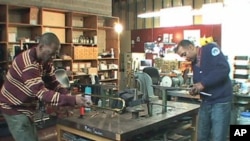Washington, D.C.'s public schools provide students with musical instruments for free. But when something goes wrong with an instrument, there are two people to do the repairs for more than 120 schools.
Charles West and Larry Jernigan approach their work with a passion. For both men, it's important that students have a joyful experience with music.
"Actually I love my job," says West. "Sometimes it seems not to be work. But it is work."
"I like the fact that I work around music all day, that my job involves music," adds Jernigan. "It involves the support of music, and it involves the education of music."
The two have worked together for almost 20 years. This year alone, they estimate they've fixed 450 instruments and tuned about 125 pianos.
"There are two of us here. We do brass, string, woodwind, percussion, piano, and electric keyboard," says West. "If you take it outside, you are talking six, seven different individuals to fix what I just stated."
The two say they specialize in pretty much everything, and have not yet met an instrument they could not fix.
"There are instances when we run across an instrument that is just beyond economical repair," says West. "So we just strip the parts from that and use those parts to give life to other instruments."
Both men are musicians, and music lovers, so learning to do repairs came naturally.
"I have been a musician all of my life. I am almost 50 now and I have been playing instruments since I was six years old," says West. "I played in an orchestra here in the city. I majored in music in college. I played in an army band."
Jernigan's musical interests are varied. "I was formerly trained in the piano and guitar. The alto sax, the clarinet, and the flute, I picked up while working here."
In addition to fixing instruments themselves, the two also go to schools to instruct teachers and students on how to make minor repairs of their own, so they don't panic if something happens just before a performance. West believes if children start early and stay involved with music, it enhances other areas of their lives.
"I see that in other kids. I see it in myself. I have seen it hundreds of times and it works," he says. "They learn teamwork. They learn solo work. They learn camaraderie, they learn patience and they learn respect."
But West has concerns about the future of music in the electronic age.
"In this electronic age, this instant age has taken away from the sit down, the patience. There is no patience. And to learn to play an instrument, it takes patience, it takes diligence, it takes time."
Being able to enjoy music on the job is one of the fringe benefits of the job. Both men agree their best rewards are the students' performances, which they often record.
"When I get to go see a concert, or go see one of the bands perform, or the children playing, or the choir singing," Jernigan says, "that is probably the one that gets me the most because we had a big part into making that a success."




